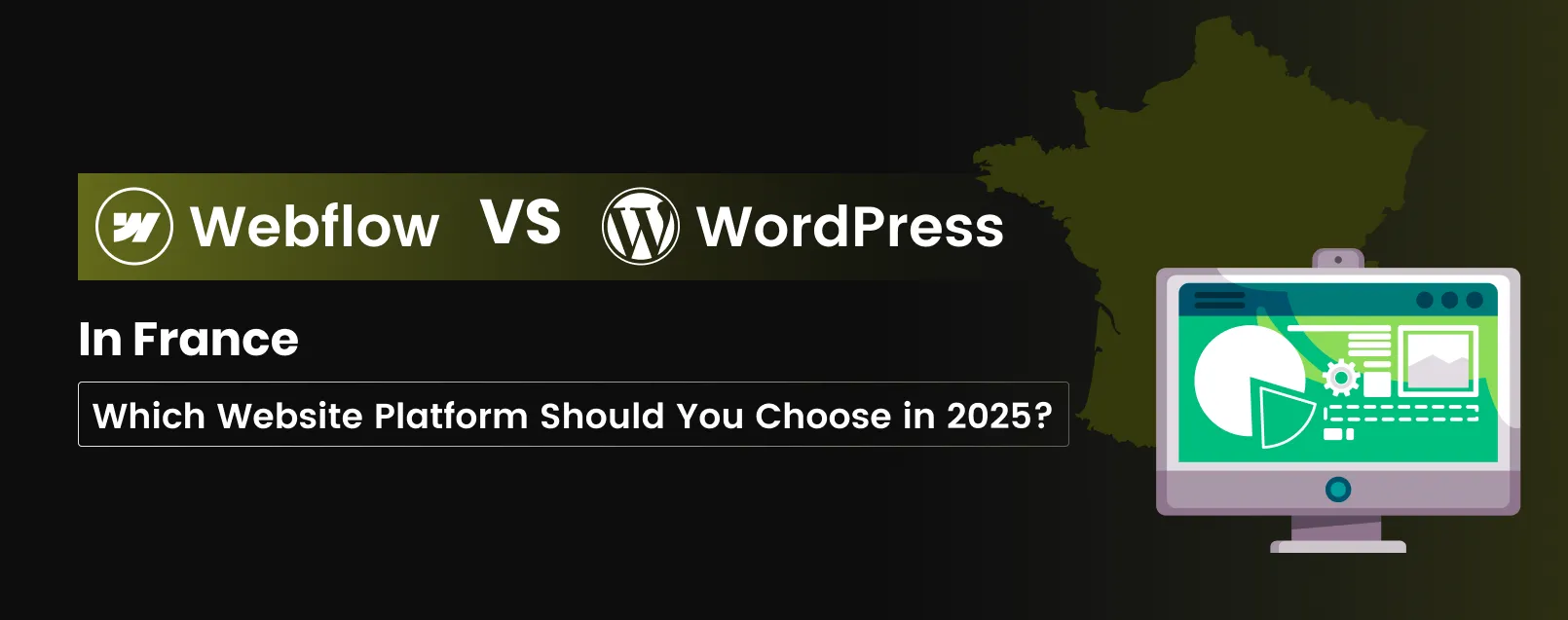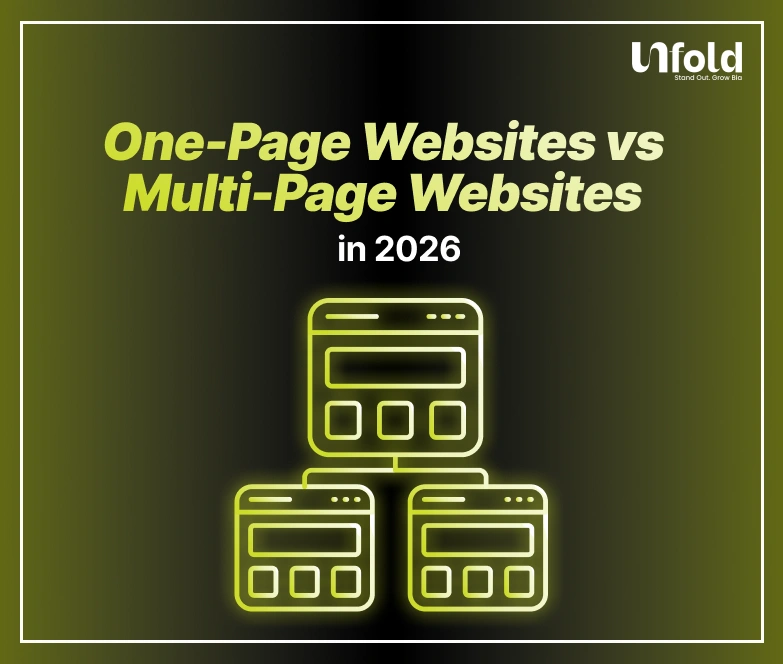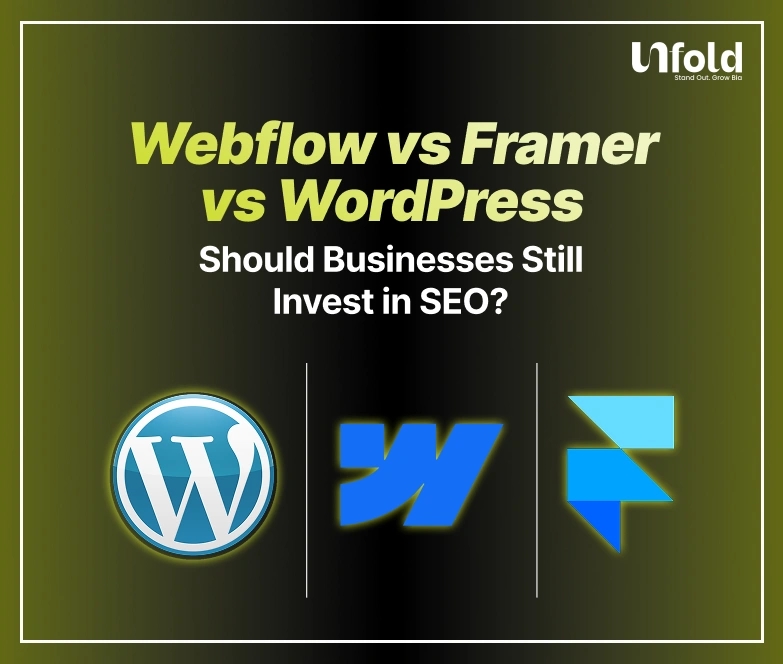

Webflow vs WordPress in France: Which Website Platform Should You Choose in 2025?

Webflow and WordPress are two of the most widely used platforms. Both have their strengths, but which one is the best fit for businesses in France, whether you’re a startup, agency, or established brand?
In this article, we will compare Webflow vs WordPress, specifically for French businesses in 2025, covering performance, SEO, design flexibility, and key factors that matter for French entrepreneurs.
Quick Overview: Webflow vs WordPress
What is Webflow?
Webflow is a no-code web development platform that allows users to design and launch responsive websites without writing a single line of code. It offers pixel-perfect control over design, user interactions, and SEO, while also providing hosting services.
In France, Webflow is becoming the go-to platform for:
- Design agencies looking for cutting-edge visuals
- Startups needing modern, interactive websites
- Tech companies and SaaS businesses that prioritize performance
What is WordPress?
WordPress is an open-source CMS (Content Management System) known for its flexibility and vast plugin ecosystem. It is the most widely-used CMS in the world, powering over 40% of the web. In France, WordPress remains the preferred choice for:
- Content-heavy websites, like blogs or news portals
- E-commerce websites through plugins like WooCommerce
- Custom web applications requiring third-party integrations
While WordPress is powerful, it can become difficult to manage without technical expertise, especially for non-developers.
Key Considerations for French Businesses
1. Performance and Core Web Vitals
For businesses in France, website speed and performance are crucial to SEO rankings. Google uses Core Web Vitals as ranking signals, and websites must deliver a seamless experience across devices.
- Webflow provides built-in performance optimization, including CDN-backed hosting and automatic image compression.
- WordPress can achieve fast performance with proper optimization, but it requires caching plugins (like WP Rocket) and a reliable hosting provider.
Verdict: Webflow is better for businesses seeking a high-performance site with minimal setup. WordPress requires more maintenance to stay competitive.
2. SEO Optimization in France
SEO is critical for any digital business in France, where organic search is a primary traffic driver.
- Webflow makes SEO easy with clean, semantic code, native meta tag management, automated sitemaps, and built-in schema.
- WordPress offers robust SEO functionality through plugins like Yoast or RankMath, which provide more granular control over SEO elements but add complexity and require constant plugin updates.
Verdict: Webflow offers a more seamless SEO experience for businesses that want to focus on content and strategy without worrying about plugins or updates.
3. Design Flexibility and User Experience
In France, design-first brands and businesses need platforms that allow for creative freedom and fine-tuned visual experiences.
- Webflow offers a visual builder with pixel-level control over layout, typography, animations, and interactions. It's perfect for agencies, brands, and designers who want to create unique, high-end websites.
- WordPress relies on themes, which can limit design freedom. Customization often requires a developer’s help to modify the theme or build custom templates.
Verdict: If your French business requires cutting-edge design and custom animations, Webflow is the way to go. For basic design needs with minimal customization, WordPress can work.
4. Security and Data Compliance (GDPR)
In France, data protection and GDPR compliance are paramount. Businesses need to ensure that their websites are secure and respect users' privacy.
- Webflow is built with GDPR compliance in mind, offering SSL certificates, data encryption, and server-side security features to protect user data.
- WordPress requires additional security measures. Though there are plugins to ensure GDPR compliance (e.g., Cookie Notice), businesses need to take an active role in managing their site’s security and privacy settings.
Verdict: Webflow is more secure by default and simplifies compliance, making it a better choice for businesses that want to avoid the hassle of managing plugins and security issues.
5. Developer Availability in France
France has a strong tech ecosystem, with a large number of WordPress developers available for custom builds. WordPress remains the go-to choice for businesses needing custom plugins, e-commerce integrations, or large-scale content websites.
However, Webflow is growing in popularity as more designers and creative agencies adopt it for its ease of use and fast development cycles. It's ideal for businesses looking for rapid deployment without extensive coding.
Verdict: WordPress is better for large-scale custom builds that require backend control, while Webflow is great for businesses that want full creative control with minimal developer support.
Real-World Use Cases in France
At UnFoldMart, we’ve helped numerous businesses build websites on both platforms. Here are some examples of our work:
Atmosly (Webflow)
We built Atmosly.com, a high-tech platform, using Webflow to deliver a sleek, fast website. Their global audience needed a high-performance site with dynamic content, and Webflow's CMS, combined with fast loading speeds, fit their needs perfectly.
Wishlink (Webflow)
For Wishlink, a fashion-tech startup in India, we leveraged Webflow to create an interactive, mobile-responsive website. We used Webflow's design flexibility to highlight their product catalog and improve conversion rates.
SquareOps (WordPress)
For SquareOps, we built a robust WordPress site to handle long-form content, blog posts, and detailed product documentation. The flexibility of WordPress was ideal for their editorial needs, though it required regular updates and management.
Cost Comparison for French Businesses
Verdict: Webflow’s transparent pricing provides more predictable costs. WordPress can be cheaper upfront but often incurs hidden costs for plugins, hosting, and ongoing development.
CMS and Content Workflows
- Webflow’s CMS is ideal for businesses that need to manage portfolios, product listings, or marketing sites with a visual-first approach. It’s easy for non-technical teams to update content and manage SEO.
- WordPress is the best choice for businesses that need complex content workflows (multi-author blogs, comment sections, etc.).
Verdict: For agile marketing teams and design-focused businesses → Webflow. For large-scale editorial teams → WordPress.
Maintenance and Scalability
- Webflow offers a hands-off experience once your site is live. There are no updates or plugin conflicts to manage, and scaling is handled seamlessly with built-in infrastructure.
- WordPress requires ongoing maintenance, especially when it comes to plugins and themes. It may also need custom development when scaling to larger traffic.
Verdict: Webflow is a better option for French businesses that want to focus on growth rather than maintenance. WordPress is still a great choice if your website needs frequent customization or plugin integrations.
Which One Should You Choose in France?
For most French businesses, especially those in tech, e-commerce, and design, Webflow is the ideal platform. It offers fast performance, modern design features, and minimal maintenance, which is why it’s becoming increasingly popular among agile teams in France.
For businesses that rely heavily on content creation or need extensive third-party integrations, WordPress remains the most flexible option.
Build Your Website with Ease
At UnFoldMart, we help French businesses create high-performance websites using both Webflow and WordPress. Whether you need a beautifully designed Webflow site or a fully customized WordPress platform, we have the expertise to bring your vision to life.
Explore our portfolio and book a free consultation to discuss how we can help you grow your digital presence.
FAQs
Got Questions? We’ve Got Answers – Clear, Simple, and Straight to the Point
Yes. Webflow includes SSL, encrypted hosting, and built-in privacy tools, making it easier for French businesses to stay GDPR compliant.
WordPress can start cheaper, but costs rise with plugins, hosting, and maintenance. Webflow has transparent monthly pricing with hosting included.
French startups and creative agencies often choose Webflow for its speed and modern design, while WordPress remains strong for blogs and e-commerce.
Webflow is ideal for design-first, GDPR-compliant sites, while WordPress is best for content-heavy websites needing advanced customization.
Still have questions?
No question is too small—let’s talk

Want to Turn Your Brand Into a Scalable Growth Engine?
We help modern businesses unify branding, websites, SEO, and paid media into one performance-driven system designed to scale.





